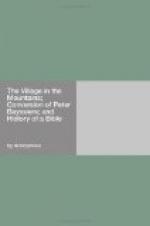Indeed, my dear children, I did not find a single passage which established it, either directly or indirectly: on the contrary, I was struck with many declarations completely opposed to it. Thus I read in St. Matthew: “The wicked shall go away into everlasting punishment, but the righteous into life eternal.” Matt. 25:46. This absolutely destroys the idea of any intermediate abode between heaven and hell.
I read the song of Simeon, by which it clearly appears that the good old man had no idea that he was to stop in the road to heaven, or that he would have to undergo any purging fire before he could get there; for he exclaims, holding the infant Jesus in his arms, “Lord, now lettest thou thy servant depart in peace, for mine eyes have seen thy salvation.” &c. Luke, 2:29, 30.
I read the promises which Jesus made to the thief on the cross, when he said to him, “Lord, remember me when thou comest into thy kingdom.” Luke, 23:42, 43. If there were such a place as purgatory, and if any one were likely to be subjected to its fires, surely it would have been this malefactor, condemned by human, laws, and probably guilty of many crimes: yet our Saviour replies, “Verily, I say unto thee, to-day thou shalt be with me in Paradise.”
I read in the Epistle of St. Paul to the Romans, that “there is now no condemnation to them which are in Christ Jesus.” Rom. 8:1. A doctrine altogether opposed to that of purgatory, which teaches that Christians are, after this life, subjected to a process of torments before they are free from condemnation.
I read in the Epistle to the Hebrews, that “it is appointed to men once to die, but after this the judgment,” Heb. 9: 27, which clearly proves that the destiny, both of the bad and good, is irrevocably fixed from the moment of their death; and that there is no purgatory, from which masses, prayers, or rather gold and silver, can deliver any one.
I read also in the first Epistle of St. John, that “the blood of Jesus Christ,” the Son of God, “cleanseth us from all sin,” 1 John, 1:7, which excludes all other kinds of purification, and formally contradicts the doctrine of purgatory. Finally, I read in the book of Revelation, that “blessed are the dead which die in the Lord, from henceforth: yea, saith the Spirit, that they may rest from their labours, and their works do follow them.”
Here is another declaration which confirms what the preceding and many other passages establish in so convincing a manner. Not having discovered a single text of the New Testament which told in favour of purgatory; but, on the contrary, having observed and meditated on those which I have quoted, and many other equally opposed to this doctrine, I was fully persuaded that it never had been thought of by the writers of the Gospel. You may easily believe, my dear children, that this discovery in no way tended to strengthen the bonds which held me to the Romish church, nor to confirm me in their faith.




